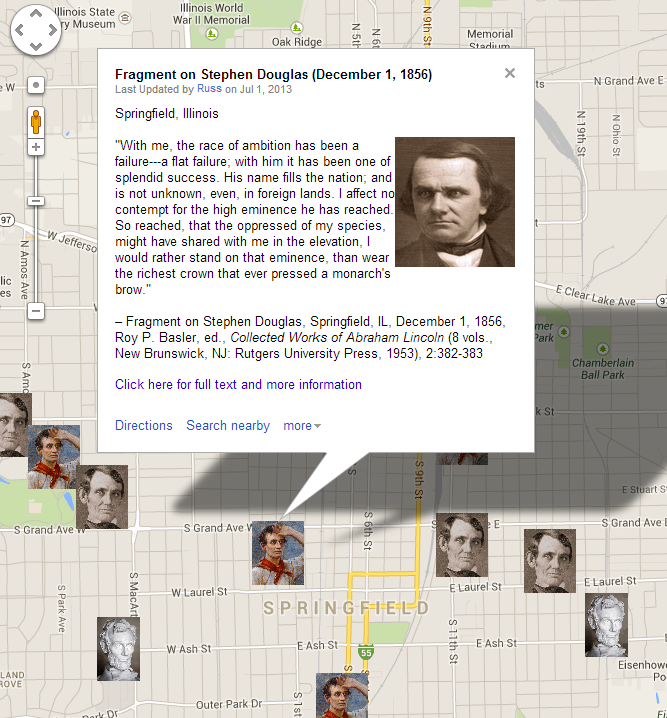Ranking
#43 on the list of 150 Most Teachable Lincoln Documents
Annotated Transcript
Audio Version
On This Date
[Editorial Note: This undated fragment has traditionally been dated in December 1856 because of references that Lincoln made to the initiation of his acquaintance with Douglas 22 years earlier.]
HD Daily Report, December 1, 1856
The Lincoln Log, December, 1856
Custom Map
How Historians Interpret
“Lincoln’s envy of the younger Douglas’s ascendency seemed to drip from him when in 1856 he wrote: ‘wenty-two years ago, Judge Douglas and I first became acquainted; we were both young then—he a trifle younger than I. Even then we were both ambitious, I, perhaps quite as much as he. With me, the race of ambition has been a failure—a flat failure. With him it has been one of splendid success. He name fills the Nation, and it is not unknown in foreign lands.’ Lincoln acknowledged the stellar rise of the diminutive Douglas. The first time he saw Douglas—buttonholing legislators in Vandalia in 1834 to pass two self-serving bills—Lincoln’s play on words disparaged the five-foot four-inch Easterner as ‘the least man I ever saw.’”
—Reg Ankrom, Stephen A. Douglas: The Political Apprenticeship, 1833-1843 (Jefferson: McFarland, 2015), 4.
“This extraordinary admission was by a man who was not down on himself for past failures. Rather it was an honest summing up of where he had been. Now he sensed he was close to attaining that ‘eminence’ that he for so long had seen the Little Giant enjoy. And once again, it would be a speech by Douglas that would prod him into the arena after he spent the first half of 1857 exclusively on his legal business. Just as he ignored the outcry over the Kansas-Nebraska Act for months, he said nothing publicly about the Dred Scott decision of March until June, two weeks after listening to an extemporized speech at Springfield by Douglas who defended ‘that principle of self-government which recognizes the right of the people of each State and Territory to form and regulate their own domestic institutions.’ Equipped with a published copy of the address, Lincoln critiqued Douglas’s ‘vaunted doctrine of self-government’ as a ‘deceitful pretense for the benefit of slavery.’”
—Martin H. Quitt, “In the Shadow of the Little Giant: Lincoln Before the Great Debates”, Journal of Abraham Lincoln Association 36, 2015.
“A Democratic paper, in commenting on this address, sneered at Lincoln as a failure in whatever he turned his hand to. He probably would not have disagreed strenuously. Around that time he wrote a private memo contrasting his lack of success with Douglas’s string of accomplishments: ‘Twenty-two years ago Judge Douglas and I first became acquainted. We were both young then; he a trifle younger than I. Even then, we were both ambitious; I, perhaps, quite as much so as he. With me, the race of ambition has been a failure – a flat failure; with him it has been one of splendid success. His name fills the nation; and is not unknown, even, in foreign lands. I affect no contempt or the high eminence he has reached. So reached, that the oppressed of my species, might have shared with me in the elevation, I would rather stand on that eminence, than wear the richest crown that ever pressed a monarch’s brow.’ In 1858, the relatively obscure Lincoln would challenge the internationally famous Douglas in what became known as the Lincoln-Douglas debates, not the Douglas-Lincoln debates. They would help raise Lincoln to national prominence and fatally injure the Little Giant’s chances to win the presidency. In time, most people would remember Douglas only as Lincoln’s debate opponent, while the name of Lincoln would ‘fill the nation’ and be revered in foreign lands.”
NOTE TO READERS
This page is under construction and will be developed further by students in the new “Understanding Lincoln” online course sponsored by the House Divided Project at Dickinson College and the Gilder Lehrman Institute of American History. To find out more about the course and to see some of our videotaped class sessions, including virtual field trips to Ford’s Theatre and Gettysburg, please visit our Livestream page at http://new.livestream.com/gilderlehrman/lincoln
Searchable Text
Twenty-two years ago Judge Douglas and I first became acquainted. We were both young then; he a trifle younger than I. Even then, we were both ambitious; I, perhaps, quite as much so as he. With me, the race of ambition has been a failure—a flat failure; with him it has been one of splendid success. His name fills the nation; and is not unknown, even, in foreign lands. I affect no contempt for the high eminence he has reached. So reached, that the oppressed of my species, might have shared with me in the elevation, I would rather stand on that eminence, than wear the richest crown that ever pressed a monarch’s brow.

